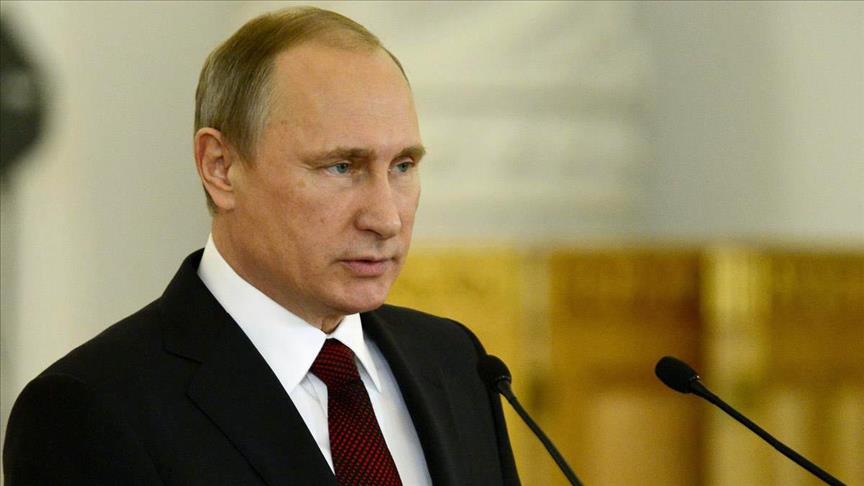
By Ahmet Gurhan Kartal
LONDON
The downing of a Russian warplane that violated Turkish airspace was the result of deliberate Kremlin policy, according to leading defense analysts.
Nick Watts, the deputy director general of the U.K. Defence Forum, said the incident came after a “policy choice” by President Vladimir Putin’s government.
“There was nothing ‘inevitable’ about the shooting down of a Russian SU-24 on Tuesday,” he told Anadolu Agency. “Russia has carefully calibrated its actions in Syria - as elsewhere.”
He said the Russian bomber’s incursion into airspace over the southern Turkish province of Hatay followed a pattern of threatening the territory of both NATO and other nations over many years.
“What happened on Tuesday was the result of a policy choice by the Kremlin,” Watts claimed.
On Tuesday, two patrolling Turkish F-16 fighters intercepted the Russian warplane and, under Turkey’s rules of engagement, shot it down after it crossed the Turkey-Syria border.
The intruding aircraft was warned about the violation 10 times within five minutes.
Russia has said its aircraft did not cross into Turkey before it was shot down.
However, a radar trace map and radio records released by the Turkish military show the SU-24’s path into Turkish airspace and demonstrated the numerous warnings issued to the Russian pilots by a command center based in the southern Turkish province of Diyarbakir.
NATO later confirmed the accuracy of information supplied by Turkey.
Think tanks across Europe have previously published details of similar violations by Russia since start of the 2014 Ukraine crisis and the annexation of Crimea.
Thomas Frear, a research fellow with European Network Leadership, said his group had “consistently warned that the sharp increase in military encounters since the beginning of the Ukraine crisis has made the risk of either an accident involving a civilian aircraft or a miscalculation resulting in a military engagement increasingly likely.
“This danger is made more acute in light of the increasingly large military exercises being staged by both sides. The lack of any multilateral agreement on managing such encounters, whether over Syria or elsewhere, dramatically increases chances of escalation.”
Warning to Russia
Watts said Russia should take the latest incident as a warning from NATO.
“NATO has sought to downplay the incident on Tuesday,” he said. “The alliance will be hoping that this incident will be taken by Moscow as a warning - countries can defend their sovereign airspace. Perhaps the same lesson will be applied in the Baltics.”
In addition to Ukraine, the Baltic region is an area where NATO is wary of increased Russian aggression.
Last month, U.K. Defense Secretary Michael Fallon unveiled plans to station British troops in the region “to respond to any further provocation and aggression” towards NATO allies.
Frear told Anadolu Agency that NATO should be clear in its message to Russia following Tuesday’s episode.
“This incident should focus minds at NATO regarding determining a more standard response to future Russian incursions, as currently each NATO member follows their own rules of engagement,” he said.
“A determined response in this respect would send a clear signal to Russia that there are no weak links in the alliance.”
He said he did not anticipate an escalation in tension between Turkey and Russia but pointed out that NATO would be obliged to assist Turkey in the event of any threat.
“Any Russian retaliation against Turkey will almost certainly be of a more indirect nature than a military response,” he said.
“We have already seen Foreign Minister [Sergei] Lavrov discourage Russian tourists from visiting Turkey… Any military response is a different matter. However, we have no reason to believe that other NATO allies would renege on their Article 4 and Article 5 obligations to Turkey if Russia threatens or attacks it.”
Under Article 4, a NATO member can call a meeting of other members if it feels its independence or security are threatened. Article 5 is the keystone of NATO and states that an attack on one member is an attack against all under the notion of collective self-defense.
However, it only commits a member state to “assist” and take “such action as it deems necessary”. It does not automatically result in military action.
“The NATO alliance needs to be more conscious of what the Article 5 ‘guarantee’ actually represents,” Watts said.
Russian jets previously violated Turkish airspace in early October. Following the two incursions, Russian officials apologized and pledged not to repeat the incidents. Turkey also warned Russia about its rules of engagement on its southern border, including a possible military response.
Anadolu Agency website contains only a portion of the news stories offered to subscribers in the AA News Broadcasting System (HAS), and in summarized form. Please contact us for subscription options.







